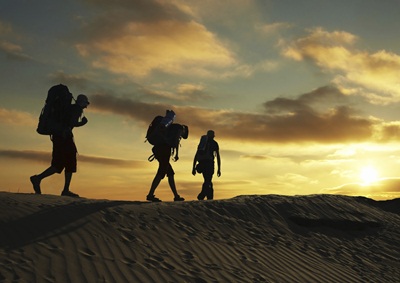How many of us have bought that massive 70+ liter backpack and proceeded to fill it to the brim? Hands up!
Yeah, this is one of the biggest mistakes that we can make as backpackers. The theory is simple: you will always completely fill up whatever size backpack you have. So in order to combat this, the best thing to do is to buy the smallest one you think you can manage with.
This can be a very difficult thing to try and get your heads around initially, but it’s so effective.
A backpack that’s ultralight ultimately means more enjoyment and less stress, both physically and mentally. Who wants to be walking for hours around a foreign city with the sun beating down on you and over 30 kgs strapped to your frame?
Here’s a few tried and tested backpacking tips that will hopefully make life that be easier for you as you travel:
1. Get a digital weighing scale. This will give you a visual idea of how much weight each item you’re thinking of sticking into your backpack with be.
2. If you can try and lose some weight from your body itself, then this can really make things significantly lighter. This is without doubt the best reduction to overall weight that you can do, plus you will feel healthier in the long run.
3. Lay out all the clothes you may think you will need for the trip, and then leave half of them at home. This is most definitely the truth. We don’t need half of the stuff we bring with us on our travels.
4. Avoid packing at the last minute. This will usually result in packing things we really don’t need(just as a precaution). We will end up throwing them out along the way.
5. Plan the route ahead if you are travelling with a companion, that way you can share the weight of things like tents and cooking gear.
6. Buy a really lightweight backpack. This will free up some much need weight. You can pick up decent packs nowadays that weigh less that 2kgs.
7. As already discussed above, don’t buy a pack that has loads of volume. Try and keep it around the 50 liter mark.
8. If you can, try and see what the back feels like without using the hip belt. Some people have reported that if actually feels better.
9. If you don’t use the sternum strap, then get rid of it altogether, as it can become a nuance.
10. Cut away some of the length from both the straps on the pack and the waist belt. These can get in the way every now and again, so it’s a very good tip to just cut them, but leave them long enough so that you can still use them efficiently.
11. Try removing any reinforcing material(like aluminium stays) that are in the backpack. You shouldn’t need these, especially if your pack is ultralight.
12. See if you can replace big buckles and cords with lighter ones.
13. If your pack becomes torn or ripped along the way, don’t worry. You can use some duct tape and a needle and thread to make some small repairs.
14. If you don’t have a backpack cover and find yourself needing one, then a good quick solution is to use a garbage bag. You can even use your rain jacket as a makeshift cover if you are concerned about stuff inside it getting wet!
15. Use compression bags to help reduce the volume inside your pack. These are very effective at managing space.
16. If you think you might need a sleeping bag on the trip, then try and get one that’s as light as possible, but will also provide you with the warmth you may need.
17. Definitely bring a small travel towel. These are an excellent piece of gear, as they can soak up up to five times their weight in water.
18. Rather than bringing big, heavy items of clothing with you – try and layer up. It’s more effective and also allows you more space or other essential items in your backpack.
19. Try and keep your sleeping bag clean.
20. Use dry bag for keeping dirty items of clothing in. This will prevent them from smelling and ruining other clean clothes.
21. Buy quick drying light items of clothing. These will make things very easy for you when it comes to either washing them yourself, or getting them washed somewhere else. They literally will dry in a matter of a few hours while left at room temperature.
22. Don’t use cotton. They don’t dry quickly, and they dramatically add a huge amount of weight to your pack if they’re aren’t dried.
23. Keep your documents safe. This can’t be stressed enough. So many of us don’t take enough care when we go away travelling. If we lose our phone or computer, we can in theory still travel and continue our journey as it’s not the end of the world. But if we lose our passport and all our credit cards/money, then we very well may have to return home with the tails between our legs.
Hopefully, you will have gained some useful bits of advice from the above few tips. Take the time to think about your trip in detail and plan accordingly. It will make all the difference in the end.
Safe travels!


